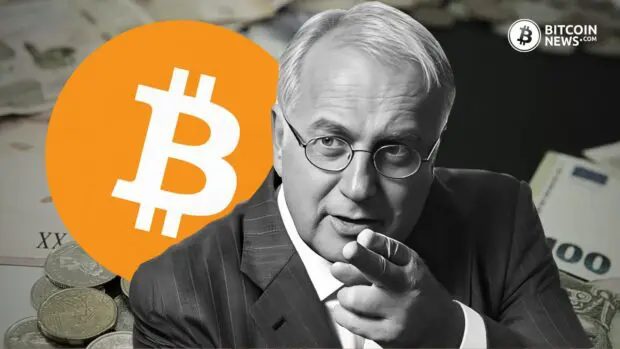Bitcoin, the world’s first scarce digital asset, has been a subject of intense debate since its inception. Critics have often labeled it as a Ponzi scheme or a speculative bubble waiting to burst. However, Australian financial journalist Alan Kohler presents a different perspective in his latest article, referring to Bitcoin as an “insurrection” against the traditional financial system.
Alan Kohler on Bitcoin: More Than Just a Bubble
Contrary to popular belief, Kohler argues that Bitcoin is not a Ponzi scheme or a bubble but rather a disruptive force challenging the norms of free-market financial capitalism. He acknowledges that when Bitcoin crashed by 75% in 2022, many believed it would plummet to zero. He stated:
“A lot of people felt vindicated and many were inclined to predict, perhaps a bit too gleefully on reflection, that it would go to zero.”
However, it made a remarkable recovery, reaching record highs once again. Kohler asserts that bitcoin will actually will “never go to zero” and the skeptics are “doomed to be perpetually perplexed.”
Kohler’s words resonate with a sense of optimism for the future of Bitcoin. He adds:
“Ponzis and bubbles are a normal part of the system that allow regulators to tighten their (largely ineffective) control, but a security that regulates itself? That’s an insurrection […] So bitcoin might look like a Ponzi bubble because its price is volatile and it seems to be in the grip of speculators and scam artists, but in fact it may be the only thing that isn’t one.”
Bitcoin’s Inherent Security and Halving Mechanism
One of the key features of Bitcoin highlighted by Kohler is its inherent security and tightly-controlled issuance. He explains:
“Bitcoin is an inherently secure, tightly-controlled asset with a regulated supply and is therefore a subversion to the whole basis of free-market financial capitalism.”
Unlike traditional currencies subject to the whims of central banks, Bitcoin operates on a decentralized network governed by a set of predetermined rules. He also points to Bitcoin’s unique halving mechanism, stating it plays a crucial role in its operation. Every four years, the reward for mining new bitcoin is halved, leading to a gradual reduction in the rate of supply. Kohler emphasizes:
“A halving is where the computing power required to ‘mine’ bitcoins yields half as many units as it did before.”
This scarcity is in stark contrast to the inflationary nature of fiat currencies.
Related reading: Fiat Meaning: A Deep Dive into “Money by Decree”
The Rise of Bitcoin ETFs And Bitcoin’s Role in Society
In recent months, the introduction of Bitcoin Spot Exchange-Traded Funds (ETFs) has made it easier for traditional investors to gain exposure to the bitcoin market. Kohler notes, “Inflows into the ETFs are running at more than US$600 million per day.” This influx of institutional capital reflects a growing acceptance of Bitcoin as a legitimate asset class.
While the future of Bitcoin remains uncertain, its impact on society cannot be ignored. Kohler draws parallels to historical financial revolutions, stating:
“As for where bitcoin will end up, and what its place in society will be – will it become a means of transaction, a store of wealth or just a plaything for speculators – I have no idea.”
He likens the ongoing evolution of Bitcoin to the French Revolution, suggesting that its true impact may only be evident in hindsight.
Balaji Srinivasan, former CTO of Coinbase, echoes Kohler’s sentiments, describing Bitcoin as a “political revolution.” He predicts that nation-states failing to grasp its significance will attempt to seize control of it from citizens in the future.
Conclusion
Alan Kohler’s perspective on Bitcoin challenges conventional wisdom. Rather than dismissing it as a speculative bubble, he views it as a transformative force in finance. As Bitcoin continues to defy expectations and gain mainstream acceptance, its role in reshaping the global economy will become increasingly apparent.
In a world dominated by traditional financial institutions, Bitcoin represents a paradigm shift. Its decentralized nature, coupled with a regulated supply, challenges the status quo and offers a glimpse into a future where financial sovereignty lies in the hands of the individual. As Alan Kohler aptly puts it, many things might be ponzis or bubbles, but Bitcoin might be “the only thing that isn’t one.”










